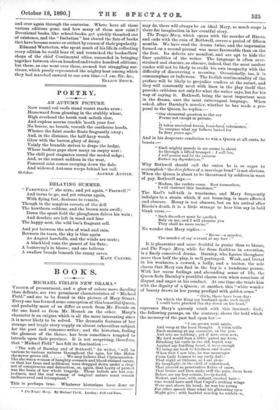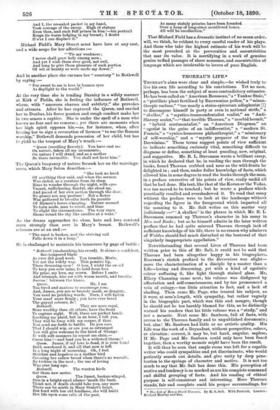BOOKS.
MICHAEL FIELD'S NEW DRAMA.* VIGOUR of presentment, and a glow of colour more dazzling than delicate, are two prominent characteristics of "Michael Field," and are to be found in this picture of Mary Stuart. Every one has formed some conception of this beautiful Queen, -and probably most of us differ as much from Mr. Fronde on the one hand as from Mr. Hosack on the other. Mary's -character is an enigma which is all the more interesting since it is never likely to be solved. The dramatic features of her strange and tragic story supply an almost exhaustless subject for the poet and romance-writer; and the historian, feeling the glamour of the theme, has been sometimes tempted to intrude upon their province. It is not surprising, therefore, that "Michael Field" has felt its fascination :—
"The wife of Darnley and of Bothwell," he writes, "will be various to various natures throughout the ages, for like Helen she never grows old We may believe that Clyttemnestra- like she was a woman of haughty counsels and blood-stained career, or that her fame and nobleness were dragged down under a ring- net of conspiracies and detraction, or, again, that laxity of protest was the basis of her whole tragedy. These beliefs are but con- jectures, and the real woman of magical nature must remain undiscovered and triumphant."
This is perhaps true. Whatever historians have done or
The Tragic Mary. By Michael Fled. London: Bell and Sons.
may do, there will always be an ideal Mary, so much scope is there for imagination in her eventful story.
The Tragic Mary, which opens with the murder of Riocio, and ends with the ruin of Bothwell, covers a period of fifteen months. We have read the drama twice, and the impression formed on a second perusal was more favourable than on the
the first. Its defects are manifest, and are apt to hide the finer qualities of the writer. The language is often over- strained and obscure, so obscure, indeed, that the most modest
reader will not be likely to credit his own incapacity with the difficulty of discovering a meaning. Occasionally, too, it is
commonplace or ludicrous. The foolish sentimentality of the preface will be likely to prejudice readers at the outset, and they will constantly meet with lines in the play itself that provoke criticism not only for what the writer says, but for his way of saying it. Bothwell, being the most important man in the drama, uses the most extravagant language. When asked, after Darnky's murder, whether he has made a pro- posal to the Queen, he replies :— " Our elemental question to the sex Forms not except in private.
It takes ancestral forces, bone-bred vehemence, To compass what my fathers lusted for In fiery years ago."
And in his desperate resolution to win a Queen at all costs, he boasts :—
" Each mighty muscle in me seems to shout As through a lifted trumpet : I will live, I will possess and let the universe
Endure my depredations."
Why Bothwell should call the union he is so eager to accomplish "the dire fetters of a marriage bond" is not obvious. When the Queen is about to be threatened by soldiers in want of pay, Bothwell says:—.
"Madam, the varlets come. Rest tremorless, I will obstruct this insolence."
The Earl's tall-talk is wearisome, and Mary frequently indulges in a strain which, if not bouncing, is more affected and obscure. Moray is not obscure, but on his arrival after Riceio's death, it is a little strange to hear him say in bald blank verse :—
"Such disorders must be quelled. Rely on me, and I will promise you They shall no more recur."
No wonder that Mary replies :—
" Recur—a murder,
The murder of my servant at my feet ! "
It is pleasanter and more fruitful to praise than to blame, and The Tragic Mary, while far from faultless in execution, is a finely conceived drama. Darnley, who figures thoughout more than half the play, is well portrayed. Weak, and brutal in his weakness, a coward, a bully, and a traitor, the sole charm that Mary can find in the boy is a handsome person. With her warm feelings and abounding sense of life, the Queen feels Darnley's youthful charm even when conscious of disgust and anger at his conduct. At one time she treats him with the dignity of a Queen ; at another, this "white wonder of beauty draws in her young prodigal with golden arms."
"Girls, there have been days On which the King my husband spoke such insult I could have plucked the sky down on his head,"
expresses Mary's queenly wrath with this insensate fool ; the following passage, on the contrary, shows the hold which the memorrof the past had upon. her :—
" I am grown weak again,
And weep at the least thought. A robin trills Each morning at my casement, on the yew, And sets me sobbing ; yet if now, even now, My lord would lean a little 'gainst my knee, Brushing his curls in the old, boyish way Against my fondling heart, it were enough To bring me back to kindness and desire. When first I saw him, he was messenger
From Lady Lennox to my early dub:e
That night at Orleans, as I sat alone By lamplight, in the chill of widowhood, That pierced as penetrative flakes of snow, That bruise and then make stiff the pain, there bent Before me my boy-cousin, lovely-faced, Modest, and rose, with radiant, crested hair-- One would have said that Cupid's arching wings Were met above his head; he was too young For other speech than what his glistening eyes _Might give : with bashful worship he withdraw, And I, the unsealed packet in my hand, Took courage of the envoy. High of stature Even then, and such full prince in him !—his portrait Keeps its warm lodging in my breast; I doubt If e'er I can displace it."
Michael Field's Mary Stuart must have love at any cost, and a wide scope for her affections "Tis my weakness ;
I never shall grow holy among men ; And yet I wish them ever good, not evil, And long to give them pleasure of such portion Of wit or beauty as were made my dower."
And in another place she excuses her " courtesy " to Bothwell by saying :—
"For sweet to me is love in human eyes As daylight to the world."
At the very time she is tending Darnley in a wifely manner at Kirk o' Fields, she is feeling the influence of Bothwell, whom, with "amorous charms and subtlety," she provokes and attracts. After he has captured the Queen, and carried her to Dunbar, his fierce passion and rough conduct make her in two senses a captive. She is under the spell of a man who knows no fear and no remorse ; yet there are moments when her high spirit opposes his,—as, for instance, when, after forcing her to sign a revocation of licences "to use the Roman worship," Bothwell demands possession of her child, but has to yield to the tempest of Mary's wrath :—
" Queen (recoiling fiercely). You have cast me On nature, taken all my sacraments;
On nature I will stand, and as a mother Be there invincible. You shall not have him."
The Queen's buoyancy of nature forsook her on the marriage- morn, which Mary Beton describes :— "She took no heed Of anything they said, and when the sermon Was ended, as a creature from its sleep Rises to wander through the night, with eyes Vacant, unflickering, fearful, she stood up, And paced of her own motion through the door. No games nor any pastime ! Not a flower Was gathered to breathe forth its parable Of Hymen's hours o'maying. Nature seemed To turn aside, man to recoil, and time To slight the circumstance. The very stars Shone round the sky like candles at a wake."
As the drama approaches its close, hate and love contend more strongly than ever in Mary's breast. Bothwell's schemes are at an end :— "The mast is broken, and the striving sail Falls down it in a heap."
He is challenged to maintain his innocence by gage of battle : "Bothwell (unsheathing his sword). It shines a confident,
fine-tempered blade As ever did good work. You tremble, Marie, Yet not the wifely way. This pensive lip, These dreaming eyes ! 0 lass, I wield the sword To keep you ever mine, to hold from foes My prize, my love, my crown. Before I smite And triumph, kiss me with warm mouth, and breathe
Success ! between the kisses.
Queen. Ha, I am
Too tired and anxious to encourage you; And, James, you are so bravely made, so doughty, You need no pricking words. Turn, I will fasten Your scarf more firmly ; you have ever loved The gayest colours, fie !
Bothwell. They are more royal, More wealthy than all others, have the front
To capture sight. Well, these are perfect hands Knotting ray plaid, but in an hour, I tell you, They will be busy with my corpse, if thus You send me forth to battle. Do you care That I should win, or are you so estranged You will give welcome to the laird of Grange
If with soft manners he report me slain,—
Curse him !—and lead you to a widowed throne
Queen. James, if my love is dead, it is your hq n -
Hath murdered it, and all that now is left Is a long night of mourning. Oh, I feel Stricken and hopeless as a mother bird Covering her callow brood when there's no warmti No twitter in the nest ; the use of loving Was over long ago.
Bothwell. The wanton birds Get them new mates.
Queen. The linnet, broken-winged, Dies in a bright-eyed silence 'neath the bush. Think not, if death should take you, any more There can be mirth in Mary Stuart's heart, But fond with her old fondness, she will build Her life upon some relic of the past, As many stately priories have been founded Over a heap of long-since mouldered bones. All will be recollection."
That Michael Field has a dramatic instinct of no mean order, will, we think, be evident to every careful reader of his plays. And those who take the highest estimate of his work will be the most provoked at the perversities and eccentricities
that mar its value. It is mortifying in a work of genuine genius to find passages of sheer nonsense, and eccentricities of language which are intolerable to lovers of pure English.







































 Previous page
Previous page